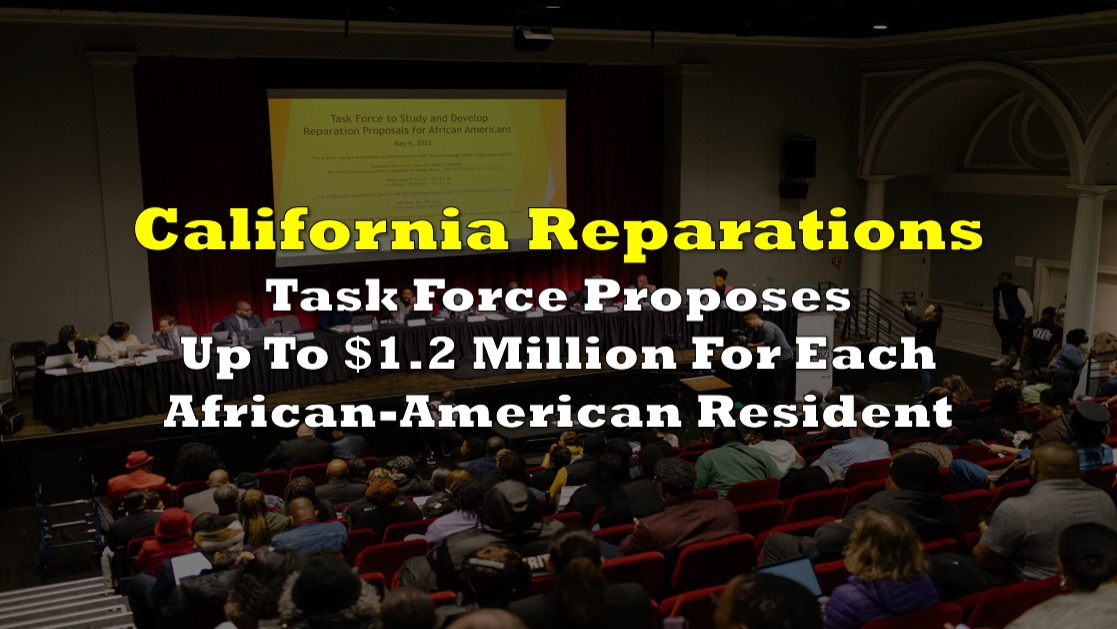A California panel on Saturday adopted recommendations that could result in hundreds of billions of dollars in payouts to Black citizens to compensate for past injustices. The suggestions to state legislators represents the country’s most comprehensive effort to design a reparations program.
The nine-member Reparations Task Force, whose work is being closely watched by politicians, historians, and economists across the country, produced a detailed plan for how restitution should be handled to address a wide range of racist harms, such as housing discrimination, mass incarceration, and unequal access to health care.
The task force’s final report, which is due to be delivered to Sacramento lawmakers by July 1, includes estimated reparation estimates calculated by numerous economists who worked with the task force.
The panel’s recommendation categorizes payouts according to the type of previous discrimination. For example, African-American residents affected by bank redlining would receive $3,366 for each year they lived in California between the early 1930s and the late 1970s, totaling up to $148,099.
Similarly, for each year they lived in California between 1970 and 2020, residents might earn around $2,352 in compensation for over-policing and mass incarceration. These payments may total $115,260.
In theory, a lifelong resident of the state who is 71 years old, the average life expectancy, may be eligible for around $1.2 million in total compensation for housing discrimination, mass imprisonment, and other harms identified in the report.
According to the report, all of these figures are preliminary and would necessitate extra investigation by lawmakers to nail down specifics. The costs to the state were not specified, but analysts believe that the expenses of housing and mass incarceration might approach $500 billion.
The panel, which was formed as a result of a bill signed into law by Gov. Gavin Newsom in the aftermath of the nationwide racial justice protests following the murder of George Floyd in 2020, has spent more than a year gathering research and attending listening sessions from the Bay Area to San Diego.
Legislators will have to consider the proposals and determine whether to make them law, which will be a political and fiscal challenge.
“Reparations are not only morally justifiable, but they have the potential to address long-standing racial disparities and inequalities,” Rep. Barbara Lee said after attending the meeting.
BREAKING: California's reparations task force has voted to approve recommendations on how the state may compensate for reparations to Black residents, with estimates projecting that the state could owe $800 billion, or more than 2.5 times its annual budget, per NPR.
— unusual_whales (@unusual_whales) May 7, 2023
Following the recommendation from the panel, the state attorney-general’s office clarified that reparations haven’t begun, contrary to the false information circulating online.
“We are aware of recent reports of electronic communications and social media posts sharing false and misleading information about African American California residents receiving monetary reparations. This information is false,” said the state justice department in its website. “The Reparations Task Force’s role is to develop recommendations for future Legislative action. Therefore, at this time, there is no claims process.”
While the panel members debated alternative means of reparation distribution — some favoured tuition or housing subsidies, while others preferred direct cash payments — they finally endorsed direct payments.
“The initial down payment is the beginning of a process of addressing historical injustices,” the report reads, “not the end of it.”
On Saturday, however, there was significant heated debate about clearly expressing the criteria in various portions of the report, particularly addressing remuneration.
If lawmakers enact payment legislation, the panel advised that a state entity be established to handle claims and provide payments, with priority given to the elderly. Approximately 2.5 million California people, or nearly 6.5 percent, identify as African American.
The panel also proposed that state legislators draft a formal apology to Black citizens when it voted on its final report on Saturday on the Oakland campus of Mills College at Northeastern University. A preliminary assessment released last year detailed how enslaved Black people were compelled to come to California during the Gold Rush era, as well as how racially restrictive covenants and redlining isolated Black Californians in many of the state’s largest cities in the 1950s and 1960s.
For much of the past year, citizens have given emotional evidence before the panel, often disclosing personal stories of racial discrimination, a lack of resources in neighborhoods due to redlining, and trauma that has had a negative impact on health and well-being. While the task force was the first such endeavor by a state, a similar bill to establish a commission to investigate reparations has been stuck in Congress for decades.
Some protested the meeting on Saturday, seeking greater payouts. One of the more outspoken attendees was Rev. Tony Pierce, who made reference to the famed “40 acres and a mule” pledge to former slaves when he ascended the podium.
“You know that the numbers should be equivocal to what an acre was back then. We were given 40, OK? We were given 40 acres. You know what that number is. You keep trying to talk about now, yet you research back to slavery and you say nothing about slavery, nothing,” said Pierce. “So, the equivocal number from the 1860s for 40 acres to today is $200 million for each and every African American.”
According to the most recent Federal Reserve Board Survey of Consumer Finances, the median wealth of Black households in the United States is $24,100, compared to $188,200 for white households. A recent research from the nonpartisan Public Policy Institute of California found that for every $1 made by white families, Black households receive 60 cents – the result of gaps in education and job market discrimination, among other things.
A Pew Research Center poll conducted last fall said 77% of African-Americans believe the descendants of persons enslaved in the United States should be compensated in some way, while only 18 percent of white Americans agree. Democrats were evenly divided on the topic, with 49% opposed and 48% in favor. Other polls on the subject have revealed similar results.
Nonetheless, cities around the country have proposed restitution. Evanston, a Chicago suburb, approved $10 million in reparations in the form of housing grants in 2021.
Recently, the San Francisco Board of Supervisors announced support for reparations worth millions of dollars. In adjacent Hayward, California, local officials are hearing reparations proposals for land seized from Black and Latino families in the 1960s.
Information for this briefing was found via The New York Times and the sources mentioned. The author has no securities or affiliations related to this organization. Not a recommendation to buy or sell. Always do additional research and consult a professional before purchasing a security. The author holds no licenses.










One Response
Forty acres and a mule, baby!
Let’s GOOOOOOOOOOOOOOO!!!!!!!